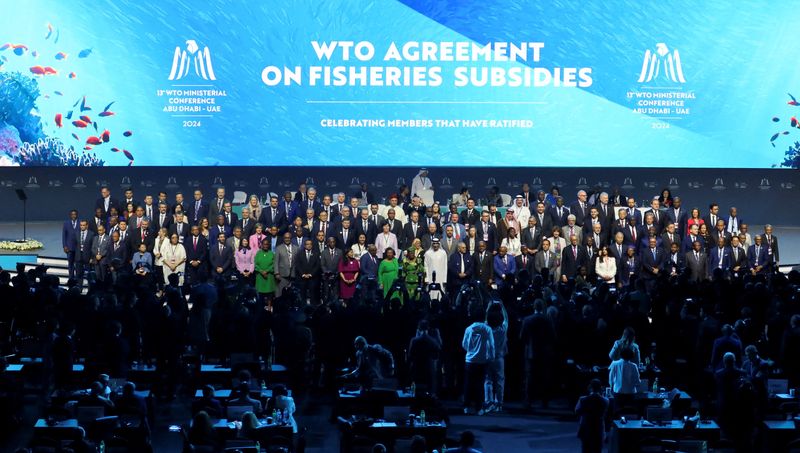
©Reuters. FILE PHOTO: Delegates pose for a family photo during the 13th WTO Ministerial Conference in Abu Dhabi, United Arab Emirates, February 26, 2024. REUTERS/Abdel Hadi Ramahi/File Photo
By Emma Farge
ABU DHABI (Reuters) – World Trade Organization (WTO) negotiators failed to break ground on key reforms in the early hours of Saturday, even as talks dragged into overtime in Abu Dhabi, in what some delegates defined it as a triumph of national interest over collective interest. responsibility.
Here’s a summary of what got accomplished and what didn’t:
E-COMMERCE
– Countries agreed to extend a moratorium on tariffs on digital goods until the next ministerial conference in two years. Then the agreement will expire at the start of that meeting, requiring more extensive negotiations.
– Several countries, including India and South Africa, have opposed the extension of a moratorium on e-commerce supported by the vast majority of countries and seen as vital for businesses to avoid tariffs on digital goods such as movie downloads.
– On the positive side, a draft program has been agreed for future work beyond Abu Dhabi.
DISPUTE RESOLUTION
– The countries agreed to commit to continuing negotiations in 2024 to try to resolve a crisis in the dispute resolution system, whose supreme court has been hampered for four years due to opposition from the United States.
– This means that many trade disputes are unresolved as countries can appeal them creating a legal vacuum and WTO rules cannot be enforced.
– Indian minister Piyush Goyal said it was “sad” that countries were hindering the results. He did not mention Washington directly, but said he had raised the issue of the lack of progress in resolving the WTO dispute system with US Trade Representative Katherine Tai in a meeting earlier this week.
– Tai said that negotiations on this issue are positive and have shown progress. However, delegates say obstacles abound and are privately skeptical that further progress can be made in a U.S. presidential election year.
– A group of countries tried to reach an amicable agreement, supported by the European Union, to refrain from appealing WTO disputes in a vacuum, but this did not gain consensus among members in Abu Dhabi, they said commercial sources.
AGRICULTURE
– No agreement was reached in Abu Dhabi.
– India, which is facing farmer protests at home and has elections due by May, has sought a permanent solution on public procurement (PSH), a term that refers to state food supply policies aimed at ensuring food safety.
– Two alternative solutions were envisaged in the draft agreement. One aimed to find a permanent solution to the issue in this meeting and the other pledges to intensify negotiations and extend to other developing countries the privileges currently enjoyed only by India under WTO rules.
– India rejected the second proposal, aimed at appeasing them, in talks between some key countries including the United States, Brazil and China, a source in the room said.
FISHING
– No agreement was reached in Abu Dhabi.
– Countries have sought to accept the second part of an international WTO agreement to curb government subsidies that critics say encourage industrial fishing fleets to empty the world’s oceans. A first part was agreed in 2022 and will come into force if and when a sufficient number of countries ratify it.
– Many participants, including USTR’s Tai, saw this as the most likely topic on which agreement could be reached. Environmentalists say it is vital to the world’s oceans.
– The chair of the talks released a new draft agreement on Friday morning with some sections still in yellow, indicating areas of disagreement, including rules for transition periods for developing countries.